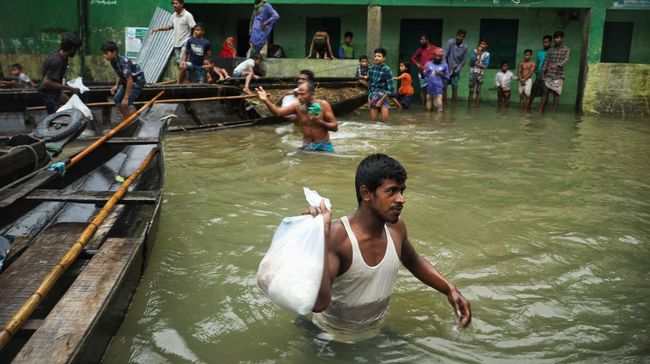18 jul 2022 om 04:58
Monkeypox in Europe mainly spreads among men who have sex with men. As a result, stigmatization of this group is lurking. An important role in preventing this lies with the media. How can the media ensure that certain groups are not cornered?
By: Michiel VosSince monkey pox has been circulating in Europe, the media has regularly discussed whether or not events aimed at the LGBTQ+ community will take place. Roel Coutinho, former director of the center for infectious disease control at RIVM, recently told news hour that the Pride in Amsterdam should be canceled this year due to monkey pox.
–
Various media (including NU.nl) took over these statements and presented a list of so-called high-risk events, in which various parties and gatherings for the LGBTQ+ community were lumped together. That leads to erroneous assumptions: First, that all of these events are aimed only at gay men. Secondly, wherever gay men congregate, there are many varying sexual contacts.
–
The organization of Pride Amsterdam therefore reacted indignantly. “We don’t organize sex parties, but an event for equal rights for people with an LGBT background.” Minister Ernst Kuipers of Public Health then stated that there is no reason not to let Pride go ahead.
–
De feiten over apenpokken
- Apenpokken is een virus dat vooral in West- en Midden-Afrika voorkomt.
- Hoewel de ziekte kan worden overgedragen via seks, wordt het niet aangeduid als soa.
- De ziekte wordt overgedragen via huid op huid contact, zoals knuffelen, en bij zoenen.
- De ziekte beperkt zich niet tot homomannen; iedereen kan het krijgen.
- De symptomen bestaan onder andere uit koorts, hoofdpijn en spierpijn. Na enkele dagen krijgen de meeste patiënten uitslag die van vlekken naar blaasjes gaan.
- Er is inmiddels in Nederland ook een kind besmet geraakt.
–
Monkey pox can affect anyone
“Designating a group or place as a possible source of fire or cause of spread can have a very stigmatizing effect,” says Anna Nijsters of Soa Aids Nederland. “We have learned from the fight against HIV and AIDS that it can be harmful to point to a certain group. In addition, Pride is much more than a party for only gay men.”
–
Pieter Brokx, director of the HIV Association, emphasizes that it should be about behavior and not just about target groups. “The risk assessment for this virus must be done without judgment. There is currently a high risk for gay men with varying sexual contacts, so that does not apply to all men who have sex with men.”
–
Nijsters is currently often approached by the media to talk about monkey pox. In every conversation she emphasizes that it is not a ‘gay disease’, but that anyone can get it. “The fact that the virus is now mainly spreading in a specific group – for which there is no clear explanation yet – does not mean that it can affect everyone.” The media cannot be blamed, she says. “I see that they are reporting this very carefully.”
–
Stick to the facts
Brokx does not share that opinion. He thinks that the media sometimes gets bogged down in a thirst for sensation. “Then nice spicy, but unsubstantiated opinions are thrown into the world and something like this comes up in the headline above an article. Many people only read the headline and this creates prejudices fed by ignorance.”
–
It is precisely this ignorance that can lead to misconceptions that lead to stigmas. “You also notice that with regard to HIV. It is no longer ubiquitous, so knowledge is disappearing. People are less concerned with it and are therefore poorly or not aware of the possible treatments against HIV. Or do not know that you have HIV. you can no longer transmit if you take medication. If it is about HIV, people quickly jump into the eighties reflex, when fear predominated.”
–
Brokx wants to call on the media to stick to the factual information. “If someone makes incorrect statements, don’t print them or let the speaker substantiate himself. And don’t be afraid to adjust incorrect information.” Although he still too often sees stigmatizing texts in the media, he does notice an improvement in contact with media companies. It has become easier to approach and correct them about potentially stigmatizing content.
–
Vaccination for risk group
Minister Kuipers recently announced that vaccinations will be made available for a group of men who have sex with men who are known to have varying contacts. This concerns people who take PrEP (a preventive medicine against HIV), who are on the waiting list to start PrEP, men who are known to have HIV and are at increased risk or men who regularly visit the soapoli.
–
Brokx emphasizes that despite the link with HIV in the vaccination program, there is no higher risk for people with HIV from monkeypox, purely because they have HIV. “The important thing is that these groups are known to the authorities. Having HIV does not increase the risk of monkey pox and the disease course is the same for people with HIV who are being treated as people without HIV.”
–
Nijsters is regularly approached with the question whether this specific vaccination procedure is not also stigmatizing. “From a medical point of view, it is not at all strange that a specific group is being called for the vaccination. The men who have been invited who I have spoken to also recognize that there is a higher risk among them and are happy to help limit the spread “To contain an outbreak, it is now important to vaccinate where the risk is highest. That is not stigmatizing, but the most effective treatment.”
–
–

